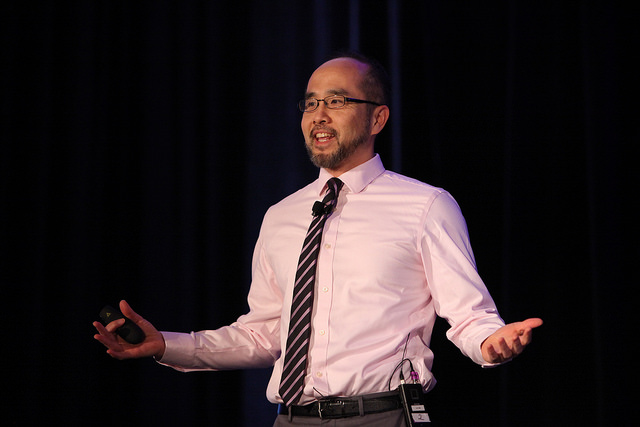“You know, I did alright last semester — I got 80s and 90s on test — but this semester is a lot harder. I know it’s because I forgot some of the material that’s a prerequisite, but also it feels like everyone else is a lot smarter than me… am I going to fail?”
I’ve had that conversation more times than I count, most recently last week. Are you going to fail? Can’t answer that, although if you’re asking there’s actually a good chance you won’t if you’re asking this question in April.
Here’s the secret I can’t tell you when you’re a student: some of your classmates who look really confident have no idea what they’re doing.
Some of your classmates who you wouldn’t imagine are acing the class.
That one guy who stays after to ask questions all the time? He’s so intimidating because you don’t even understand the questions but you’re sure they’re super-advanced? He’s got some good ideas but I don’t understand half his questions either, because he doesn’t know how to translate the ideas he’s got from, “I feeeel like this should work” to actual mathematics.
The difference between you? He just assumes his wacky feeeelings about mathematics should translate to something real, while you assume you’re probably wrong.
In high school, math is often pretty cut and dried. Sometimes there’s a specific process that your teacher wants to use to solve a problem; it’s in the curriculum so that’s how you’re graded. Specific topics are covered — you have to get through the curriculum — there’s a standardized test coming up.
In college, if you’ve got professors for teachers they’ve been through a PhD. They all struggled with some previously unsolved math problem and maybe they still do. Creativity for problem-solving is desired in a different way. I promise you, as a college prof, that if you use some other method to solve the problem and you can prove you’re right then I’ll give you credit. A lot of math breakthroughs happen because a mathematician said, “What would have to be true to make this true? What would happen if I did this illegal move in mathematics and just… tried to make things work?”
Differentiating at a cusp? Illegal, right? “What if I do it anyway?” Get distributions, generalized functions. Take the square root of a negative number: impossible! “What if I do it anyway?” Complex numbers. Divide by zero: “What would it take to make this work?” Limits. You can’t integrate this function… invent Lebesgue integrals!
So, are your classmates smarter than you? Some can do an integral faster but don’t understand the theorems. Some understand the big ideas but are slow at computation. Some want applications to physics and some think applications are really annoying. The ones you think are the smartest probably aren’t, because you are probably confusing confidence with smarts (they look the same if you’re just learning the subject). And the ones who aren’t the smartest might go the farthest. I have a PhD in math now. I was definitely good at it in high school, but I was never The Best. The guys who were The Best? Not doing math now.
Don’t discount yourself.
